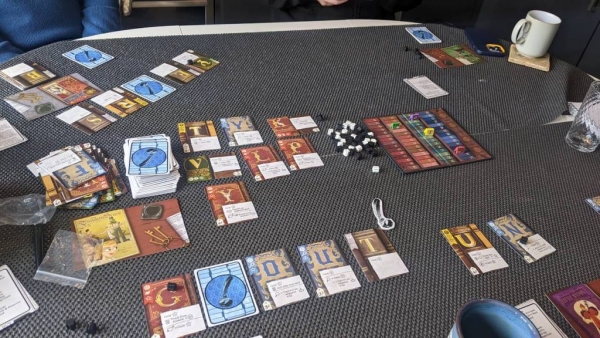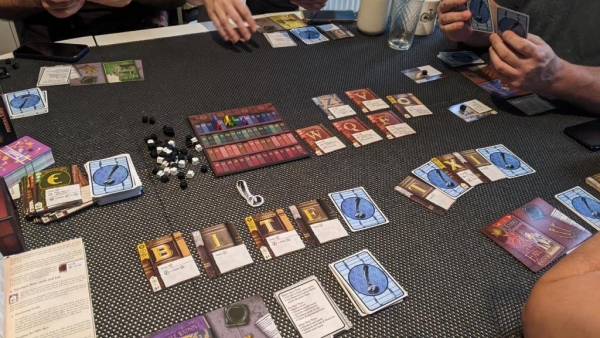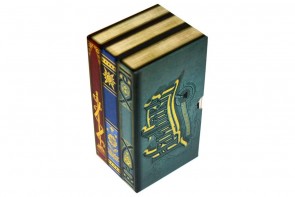Words can harm, heal, destroy relationships, build them up, send people to war or bring them to the table for peace. The right word can make us smile, grimace, laugh, or cry.
Words are a hobby of mine. It would be disingenuous to call what I do here a living. Word games have been around for who knows how long. Scrabble is the one you all know of course, but there have been numerous others over the years. They appear on TV in the guise of Countdown and similar. They grace our tables with titles like Wordsy and Letterpress. The most recent one I have added to my collection, is called Hardback.
Hardback was released in 2018 by Fowers Games and is designed by Tim Fowers and Jeff Beck (II) with art from Ryan Goldsberry. Tim Fowers games is an interesting outfit piloted by the man of that name. They release very few games but do so as a small publication and distribution operation. All their games I’ve played have been interesting and extremely well produced and Hardback is no exception.
Hardback is a fascinating hybrid of design. Your aim as with a lot of word games is to make the highest scoring word on your turn. The trick here is that your letters are coming from a deck that starts out only spitting out cash and points, but can become so much more over time. That’s right we are deck-building with letters.
 Grout
Grout
Points get you to the finish line, but what is the cash for? As with all deck-builders you are going to acquire new cards. You’ll add new letter cards to your deck from the offer, hoping to use them in later rounds to get even better cards, more points, or invoke their power.
Each letter that isn’t in the starting deck comes from a genre of fiction: romance, horror, adventure, and mystery. Each genre has its own focus in terms of abilities, be that removing cards from your deck or taking away options from other players. Of course many of these letters will also give you more points, and cash, than those you start out with.
Powers are all good and well but where this game gets really smart is how you make the words that drive the action. How you actually use these tools you are stuffing into your deck.
You’ve added a Z or maybe a Q, difficult to use letters with a potentially high pay off. You draw your hand of five and it is a smorgasbord of useless letters that you can’t even begin to figure out. A small world will get you a point, maybe a couple of bucks that won’t survive the turn. Hardback has your back. Every card can be used as any letter via the simple action of playing it face down. Sure it won’t do anything: no points, money, or powers for you. It can get you other cards on the table though, allowing you to play more, where you would have played less.
This one rule encourages so much more than just a licence to make a huge variety of words every turn. When looking at letters you can buy you see only possibilities, not restrictions. Letters that other games might see as risky, become opportunities, not problems.
Now we only have a hand of five to make our words each time, that is definitely a bit restrictive on our creativity. Here is where Hardback pulls its best mechanism out. Ink.
When buying cards you can also buy Ink for $1 a shot. Now when you draw your hand and start making your word at the start of your turn, you can spend Ink to draw more cards. The twist is that the cards you draw must be used in the word and they can’t be turned face down to be any letter.
This introduces push your luck, one of my favourite mechanisms, into a word game and it is a superb piece of design. I don’t know how many times the table has erupted as someone pushes it just a bit too far, backing themselves into a lexical corner.
Ink can be eliminated with remover, a rarer resource that allows you take Inked cards into hand to do with as you will. Besides this there are lots of little emergent tricks the game lets you pull that encourage risky plays, bold strategies, and questionable word choice.
 I have jusBites, Taxis, and someone contemplating their Ink spend
I have jusBites, Taxis, and someone contemplating their Ink spend
The wild system means that you can always get out of a jam, but the game also encourages cooperation. Not everyone can be a wordsmith and players can ask others to be a ‘ghost writer’ suggesting words from the options available. If you use their suggestion then they get a free Ink plus any of the Ink that you used to make the word. A nice incentive to help each other out.
I first played Hardback on Board Game Arena (BGA) and then went to pick up a physical copy. The BGA implementation is good and the physical version does not disappoint. It’s a compact package with loads of options to change up the game. I’ve played it with folk who don’t even like word games, but the deck-building mechanics were good enough for them to stick with it and enjoy it!
Hardback is a game that is generous. It wants you to impress your friends with your creativity and strange word choices. Bet on that big flip of a card, the games says, if it isn’t what you want then why not try again? What could go wrong? It tells you to reach out for help and rewards those who hear the call. Hardback is a game that wants you to play with language. For that reason alone, I’ll keep coming back to it.
 Games
Games How to resolve AdBlock issue?
How to resolve AdBlock issue? 


















